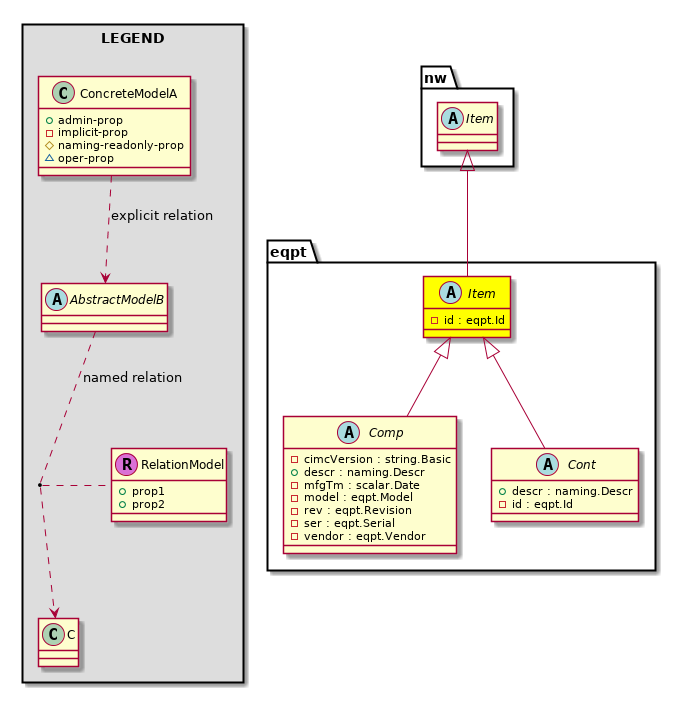├
|
![[V]](styles/eye.gif) |
eqpt:Item The abstraction for any equipment component/container in the system. |
|
├
|
![[V]](styles/eye.gif) |
eqpt:Comp An equipment component such as a card, port, transceiver, or ASIC. |
|
|
├
|
![[V]](styles/eye.gif) |
eqpt:ACore The equipment processing core information. |
|
|
├
|
![[V]](styles/eye.gif) |
eqpt:Fru An abstraction of a field-replaceable unit, such as cards, receivers, fans, and PSUs. |
|
|
|
├
|
![[V]](styles/eye.gif) |
eqpt:Card A container for different cards such as line cards and fabric cards. |
|
|
|
|
├
|
![[V]](styles/eye.gif) |
eqpt:ExtChCard The module on an extension chassis. The extended chassis is an extension of the fabric. |
|
|
|
|
├
|
![[V]](styles/eye.gif) |
eqpt:FC The fabric card, which connects different IO cards and stores all fabric related information. |
|
|
|
|
├
|
![[V]](styles/eye.gif) |
eqpt:LC A line card (IO card) contains IO ports and stores various line card related state mac addresses assigned to this card, such as whether the card went online. |
|
|
|
|
├
|
![[V]](styles/eye.gif) |
eqpt:SupC The supervisor card, which contains the CPU running control plane. |
|
|
|
├
|
![[V]](styles/eye.gif) |
eqpt:Ft The inventoried fan tray. |
|
|
├
|
![[V]](styles/eye.gif) |
eqpt:Led The abstraction of an LED. This is a superclass for LED types, such as an indicator LED. |
|
|
|
├
|
![[V]](styles/eye.gif) |
eqpt:IndLed The locator LED for monitoring the component state. |
|
|
├
|
![[V]](styles/eye.gif) |
eqpt:Mem A memory unit inside the system. |
|
|
├
|
![[V]](styles/eye.gif) |
eqpt:Obfl The onboard failure log information. |
|
|
|
├
|
![[V]](styles/eye.gif) |
eqpt:ACPU The central processing unit information (CPU). |
|
|
|
├
|
![[V]](styles/eye.gif) |
eqpt:Fpga A field-programmable gate array container. |
|
|
|
├
|
![[V]](styles/eye.gif) |
eqpt:Sensor A temperature sensor monitors the on-board temperature on the chassis. The temperatures are an input into the fan control algorithm. The chassis software adjusts fan speed to keep all sensors within normal operating conditions. |
|
|
├
|
![[V]](styles/eye.gif) |
eqpt:Ch A hardware chassis container contains chassis properties such as its role in the fabric (spine/tor) and a description of switch. |
|
|
├
|
![[V]](styles/eye.gif) |
eqpt:Port The abstraction of a standard port. This is a standard physical network interface. |
|
|
|
├
|
![[V]](styles/eye.gif) |
eqpt:ExtP An external facing port abstraction. This is similar to IO or management ports. |
|
|
|
|
├
|
![[V]](styles/eye.gif) |
eqpt:ExtAP An external extension port for a controller. |
|
|
|
|
├
|
![[V]](styles/eye.gif) |
eqpt:IoP The abstraction of an external IO port. |
|
|
|
|
|
├
|
![[V]](styles/eye.gif) |
eqpt:ExtChFP An extension chassis port, which is connected to a leaf. |
|
|
|
|
|
├
|
![[V]](styles/eye.gif) |
eqpt:ExtChHP The extension chassis port connected to hosts. |
|
|
|
|
|
├
|
![[V]](styles/eye.gif) |
eqpt:FabP A fabric port is the fabric facing external IO port. |
|
|
|
|
|
├
|
![[V]](styles/eye.gif) |
eqpt:LeafP A leaf port is an external IO port on a leaf. |
|
|
|
├
|
![[V]](styles/eye.gif) |
eqpt:IntP The abstraction of an internal port. Internal ports are internal constructs that are invisible from outside. |
|
|
|
|
├
|
![[V]](styles/eye.gif) |
eqpt:EobcP An internal Ethernet out-of-band channel port. Note that all card component management is done via this port. |
|
|
|
|
├
|
![[V]](styles/eye.gif) |
eqpt:EpcP An internal EPC port (internal hi-gig links connecting the external IO ports). |
|
|
├
|
![[V]](styles/eye.gif) |
eqpt:Slot The container multiple slot types. For example: LC slot, FC slot, etc. |
|

